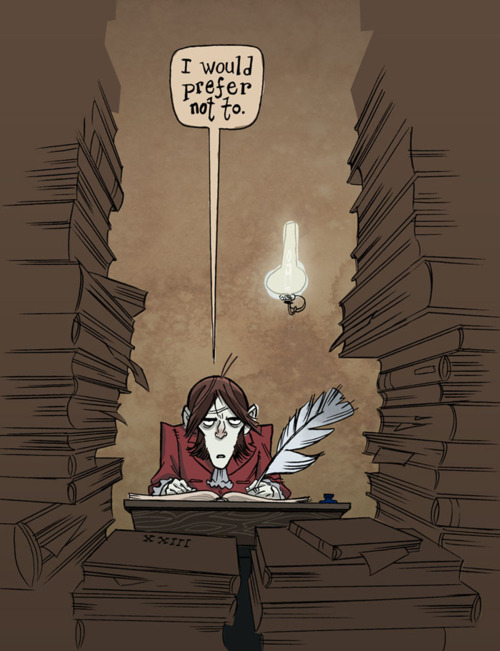
“Bartleby, the Scrivener: A Story of Wall Street” By Herman Melville is said to be one of Melville’s most studied works, even though it seems to be the least action oriented. It’s popularity is drawn from the insight Melville provides on human nature and individuality itself. In the story Melville describes a successful and overworked lawyers office, and a lawyer looking for a new Scrivener (essentially a clerk of sorts) to help pick up some weight from his overworked staff. That’s where Bertleby comes in, at first he starts as a hardworking individual, efficient, and always on point. Later he develops an unusual habit of refusing his employers work by saying “I’d prefer not to.” As the story progresses Bartlebys odd stubbornness strengthens, which ultimately leads him toward downward spiral ending in a pathetic death in prison.
The story is a unique outlook on individuality because as humans we are defined by what makes us different from the rest of the world, and yet along with that uniqueness we cannot stray from human nature itself, which prompts us to be communal creatures. In the story of “Bartleby, the Scrivener” we see individuality being morphed while becoming grotesque at the same time. Bartleby’s personality is both strengthened and yet feels lost in the midst of his refusal of everything.
Some of the blame can be put on society, saying that Bartleby was created by the mundane environment and isolation he was exposed to in life. Bartleby was said to work at what was called a dead letter office, which was essentially the location where they would burn letters that had no where to go. The narrator reflects on this at the end of the story, and laments that the experience must have psychologically effected Bartleby so much that he just snapped after joining onto the firm.
Evidence in the story suggests that the connection the narrator felt with Bartleby was the fact that he identified with Bartlebys stubborn behavior, stating “For the first time in my life a feeling of overpowering stinging melancholy seized me. Before, I had never experienced aught but a not-unpleasing sadness. The bond of a common humanity now drew me irresistibly to gloom. A fraternal melancholy! For both I and Bartleby were sons of Adam” (Para. 89.) Like he said for the first time the safety of ignoring issues were no longer enough for the narrator, he was forced to confront them through Bartleby. He reflected in the narrator his own frustration with the way society had molded him into what he claims to be a”safe man” (Para. 3.)
The Narrator and Bartleby are complete opposite reflections of one another. Bartleby chooses to fight the norms pushed on him by preferring not to do them, where as the narrator has allowed societies norms to completely engulf him through mundane work. As the story progresses Bartleby crosses the line where his individuality engulfs him. He allows this quirk of his to ultimately lead to his very death, out of refusal to be anything human. It really shows the fine line drawn where uniqueness and conformity lie. You either become the narrator, lost in a sea of grey without a glimmer of self, or you become Bartleby, lost in his own stubbornness refusing to conform to simple human nature. Balance, like in all things is necessary.
“Bartleby, the Scrivener: A Story of Wall Street” I feel is incredibly important for anyone to read, especially those joining the work force. It proves the importance of uniqueness, while maintaining that balance of communal behavior. Humans by nature need, not only one another, but to adhere to the very laws we all must abide by. The insight Melville provides us through Bartleby and the narrator is enough to motivate anyone on the journey toward balance. We learn from Bartleby that his stubbornness is almost admirable because it’s directed toward a relentless fight against societies exhausting rules, while also understanding that the fight isn’t against ones own nature. The narrator, we learn the consequences of losing oneself, but proving the importance of slight conformity.